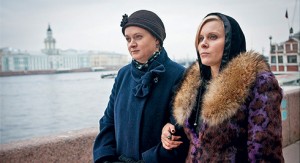Alyssa DeBlasio, Dickinson College
The present-day intelligentsia can be broadly understood as a romanticized collection of educated and disaffected workers of the “mental” professions, defined by cultural literacy, a retreat from the public and political spheres, and stereotypically “intellectual” behaviors ranging from reading literary journals to (in the twenty-first century) blogging about culture and current events.
Although philosophers like Sergei Bulgakov have projected the roots of the intelligentsia back as far as the Petrine reforms, the word appeared in the Russian language in 1836, in the diaries of Vasilii Zhukovskii.[1] When it finally came into regular use, it was in reference to a social group that had emerged in the 1850s and l860s and including Fedor Dostoevskii, Mikhail Katkov, Nikolai Mikhailovskii and, later, Vasily Rozanov and Anatolii Lunacharskii. For the most part, these writers and thinker came from the land-owning classes but not from the gentry; they were the product of the formation of an educated raznochintsy (of various ranks) in the 1840s who became déclassé as they emerged from the universities highly educated and alienated from their political surroundings. By the early twentieth century, intelligent (member of the intelligentsia) had come to refer to an educated member of the cultural vanguard with strong humanistic leanings but weak class ties—those elite who spoke out in the name of injustice and preserved cultural and intellectual values for posterity.
Advot’ia Smirnova’s Two Days (Dva dnia, 2011) juxtaposes two very different representatives of the present-day intelligentsia. Masha is a curator at a provincial literary museum; Petr is a businessman from Moscow. For Masha, Petr’s pressed suits and carefully manicured facial hair cannot possibly represent Russian cultural values; for Petr, Masha snobbism-in-poverty only reinforces the stereotype that “a member of the intelligentsia must be dirty, ragged, and poor, living in filth and eating filth.” Here, class tensions within the intelligentsia draw out the extent to which the intelligentsia, like narod, is not itself a class but a social “mode”: it transcends traditional economic divisions, in that it can include high-earning actors, middle-class university professors, and low-paid librarians. As Rossen Djagalov has pointed out, perhaps the most striking contemporary example of the intelligentsia’s classless dimension was the 2010 trial of Mikhail Khodorkovskii, where protestors from nearly every level of the pay scale—from teachers to celebrities—defended a man who was once the wealthiest in Russia.[2]
The conflict between two historically opposed modes, the narod and the intelligentsia, drives the narrative of Smirnova’s next film, Kokoko (2012). Liza is the daughter of a St. Petersburg artist: she is educated, works in the Kuntskamera, and surrounds herself with art and intellectuals. When Vika, a laborer from Ekaterinburg who sings folk songs and speaks with a strong provincial accent, enters her life, Liza sets out to teach her the ways of the intelligentsia. She reads to her from art history books, corrects her speech, and introduces her to her friends—all in preparation for a job at the museum that will never materialize. Liza’s world is made accessible to Vika and she is able to perform intelligentnost’, but only to a certain point; her lapses into vulgarity (speech, clothes, behavior) always give her away. The title of the film comes from one such lapse: Vika’s mispronunciation of the artistic movement Rococo as Kokoko.

Kokoko also hints at the loss of the political dimension of the intelligentsia, which had been so integral to its identity during the prerevolutionary and the early Soviet periods. We watch as Liza and her friends superficially stage a protest, a gesture that seems more like entertainment than politically motivated. More direct references to the past political vanguardism of the intelligentsia are present in Roman Prygunov’s Soulless (Dukhless, 2012), where a group of student-dissidents, in the style of street-art group Voina, actively protest the greed and glamur of Moscow in the 2000s. Ultimately, Dukhless takes a moderate position: capitalism and socialism come together in a dialectical love affair, which softens the positions of both sides. Nonetheless, we are given at least a glimpse of a former intelligentsia that took up class issues while being classless itself, and perhaps of a new intelligentsia to come.
December 2013
[1] See Bulgakov, “Geroizm i podvizhnichestvo,” Vekhi (M: N.p., 1910), 25.
[2] Comment at roundtable discussion (May 4, 2013), 15th Annual Russian Film Symposium, “Re-Imagining Class: Recent Russian Cinema,” University of Pittsburgh.
